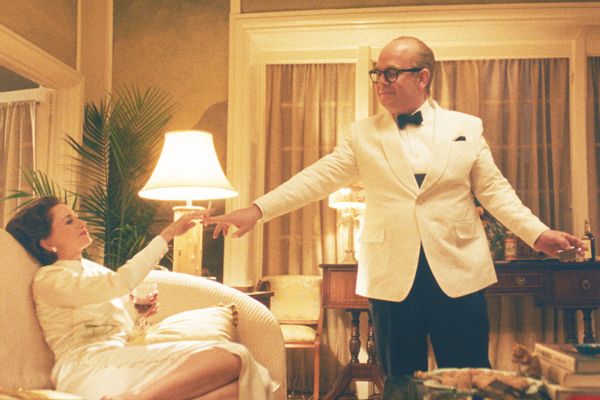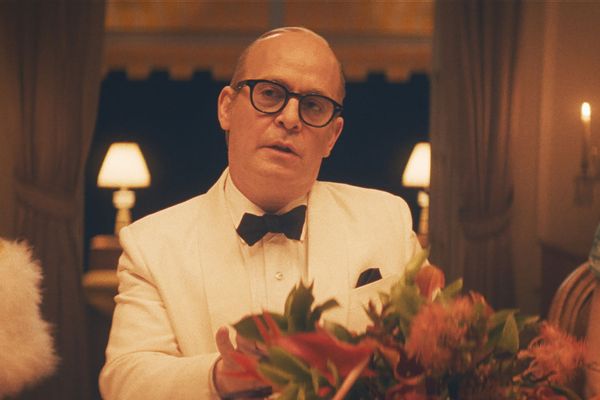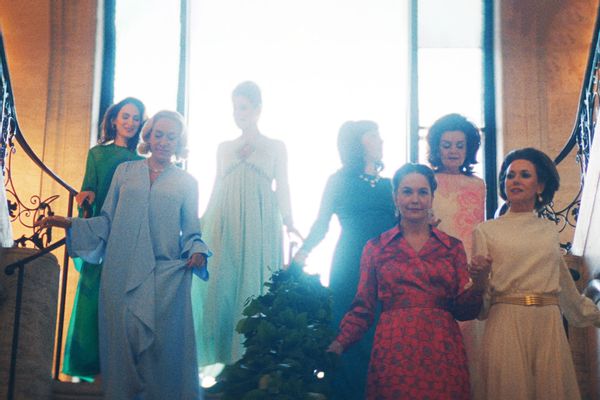
We love watching a fabulously tart-tongued and terrible woman cut her adversaries to the quick, don’t we? You know the type I’m talking about – the cruel and elegant vixens, the glittery fire-breathers, the flawlessly manicured soul-devourers. There’s a word for such ladies, but it isn't used in high society . . . outside of a kennel.
That, and the occasional tribute such as this. The word we’re looking for is b***hes. Real women either claim the term or despise it depending on who wields it and why.
Movie and TV audiences swallow the word more easily because the best of ‘em are a kick to watch – b***hes always get the best lines. A fast draw and devastating cleverness made us root for Valentina on “The White Lotus” and Cersei on “Game of Thrones,” along with Joan (“Mad Men”) and all the “Desperate Housewives” that came before her. Reach back further and your memory may be scratched by Alexis and Dominique’s wickedness on “Dynasty” and Amanda, the woman made Mondays a b***h on “Melrose Place.”
But the b***h queen might be Joan Crawford, who delivered that paraphrased line about kennel talk in 1939 as part of her comeback in “The Women.” Whether her reputation as a terror was legitimately earned or a costume worn well depends on who’s describing her.
Ryan Murphy shared his thoughts on the matter in 2017's “Feud: Bette and Joan.” His examination of Bette Davis’ rivalry with Crawford was equally sympathetic and venomous — and a good time all told, with each giving as good as she got.
Women like these are the lifeblood of Murphy’s oeuvre, especially his “American Horror Story” franchise. He’s excellent at writing them with hilariously insightful fury that's often written off as camp. That's not entirely the case; camp is diverting but cheap, whereas in work like "Feud" Murphy aims to be purposefully arch. His b***hes are not to be toyed with, but we come to see their very human aches and wounds. If they lash out at others, it is because so many sought to destroy them. Hence channeling Murphy’s brand of b***hery is an honor reserved for his main muses, typically Sarah Paulson and Jessica Lange, Murphy's Crawford against Susan Sarandon’s Davis.
Lange also shows up in “Feud: Capote Vs. The Swans,” but it’s Murphy’s name and reputation that’ll lure his faithful through the front door. But he’s merely the executive producer for this second installment in his "Feud" anthology series, leaving its eight episodes in the too-reverent hands of “Brothers & Sisters” creator Jon Robin Baitz.
Among those who recognize Truman Capote as the author of “In Cold Blood” are fewer for whom the name Barbara "Babe" Paley means anything, to say nothing of the other New York socialites in her flock. In playing Capote Tom Hollander sustains a constant level of pathetic deflation barely hidden by his disdainful behavior toward people who for reasons that are never persuasively explained, still care about him.

Babe has all the money and influence she could want as the wife of CBS chairman Bill Paley (Treat Williams, in his final role), wearing that mantle more gracefully than, say, her sometime-friend Lee Radziwill (Calista Flockhart), Jackie Kennedy’s sister, or their fellow ladies of leisure C.Z. Guest (Chloë Sevigny) and Slim Keith (Diane Lane). And Capote reminds each woman of this when the men in their life cheat on them – especially Bill.
Whenever their hearts are broken, Capote tells whatever ear is sympathetic to his high-pitched and ornate exaggerations that he’s the one who dusts them off and keeps them going, offering assistance with a downer or two or whatever else he’s on.
Hollander’s Capote is an unbearable drunk who uses people, including his friends, whom he tosses under the bus in a gossipy excerpt from his unfinished book “Answered Prayers” titled "La Cote Basque, 1965." After the piece runs in Esquire the women ice him out, making Capote persona non grata in New York high society.
This happens in the first episode, and the remaining seven show Capote struggling to get back in without ever justifying why he sold them out, and why they wanted him around in the first place.
This is the essence of what “Feud” is supposed to be, mind you. “Bette and Joan” never found a way past its namesakes' rivalry, which Murphy and his writers explained by weaving the tension between these women and their common despair. That first installment was a group effort, to be clear, but Murphy's fingerprints are more distinctly visible throughout. (He directed three of its episodes, shares a writing credit on the pilot and wrote the fifth and best chapter solo.) The scripts’ inspired exchanges and comebacks were obviously inspired by parts written for these women by the likes of Joseph L. Mankiewicz, who guided Davis in “All About Eve.”
Speaking of which, isn’t it interesting how the most marketable b***hes in entertainment tend to be created or curated by men, including most of the modern examples I previously mentioned? Alas, those characters are frequently two-dimensional, which is “Capote Vs. The Swans” undoing.
Those examples of b***hery are mostly fictional ones too. Yet, they are archetypes from which Baitz could have borrowed in this adaptation of Laurence Leamer’s 2021 non-fiction bestseller “Capote’s Women: A True Story of Love, Betrayal, and a Swan Song for an Era” without dishonoring his subjects.
But Baitz extensively invests in writing to one layer of these women’s interiority without convincing us that there's more to them than their vindictiveness, prejudice or selfishness. Murphy at least succeeds in developing other facets in his characters, even in projects that don’t entirely work.
“Bette and Joan” may have been simpler to portray in that respect because their legends preceded them, whereas only Capote’s voice and creative causticness are amply known in this story. That should be more than enough, to be clear. Men can be brilliant high-riding b***hes too; look at Roman Roy.

That fact somehow missed Baitz, leaving the audience to wonder what’s to be gained by spending hours with any of these glamorous layabouts. Capote, especially, is written as a man with a knack for driving everyone away except for the ghost of his departed mother, played by Lange as if she were raised from the “Murder House” season of “AHS.”
Nevertheless, Gus Van Sant’s luxuriant directing ensures that “Capote Vs. The Swans” is aesthetically solid, especially in interludes such as the black and white third episode’s retreat to 1966 for a fictionalized project by the Maysles brothers – an invented scenario in which Capote plays each swan’s vanity against the others leading up to his storied Black and White Ball.
Another fabrication simultaneously worth savoring and lamenting is Chris Chalk's appearance as James Baldwin, who swoops in during the fifth episode to pull his dear fellow gay writer out of his funk. These scenes mean well and are employed to make a point about the soft-soled bigotry insinuated throughout the upper class. But they also make one wish this wan treatment had kept Baldwin’s name out of its mouth.
Chalk is enthralling as Baldwin, especially in a scene-chewing monologue near the close of his visit in which he indignantly lambastes Capote’s self-pity amid his incredible fortune. Both men are literary stars at this point, but while Capote was invited to make film and TV appearances, Baldwin followed the way of many Black artists and intellectuals in 20th century who became fed up with American racism and exiled himself to Paris. To picture Baldwin as caring enough about Capote’s sadness over losing access to his exclusionary patrons to drop what he’s doing and devote a “buck up, buttercup” day on the town with Capote beggars belief.
One hint “Capote Vs. The Swans” doesn’t quite glide is that it’s being promoted as "the original Real Housewives,” which is a disservice to both Bravo socialite-wrangler Andy Cohen and this cast. Bravo’s housewives may be as shallow as Capote’s, but Cohen is a master at casting problematic people into addictive spectacles. Conversely, Baitz and that cast stuff so much effort into their characters as to make them stiff objects instead of granting them the flexibility to be wickedly real.

But then it’s difficult to fathom any sorrow stirring for a group of people who both invite such misery on themselves and ask for little sympathy in return, which describes most of Capote’s women – and it is with them that we spent an inordinate amount of time. This is the story’s main obstacle. Not only are these swans relatively obscure beyond certain worlds to start with, but this “Feud” gives us few reasons to want to know them. But that’s the other side of b***hes, isn’t it? Unless they're unquestionably entertaining, the best course is to steer clear.
"Feud: Capote Vs. The Swans premieres at 10 p.m. Wednesday, Jan. 31 on FX and FXX and streams the next day on Hulu.







